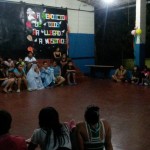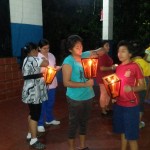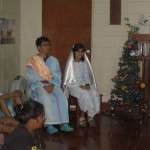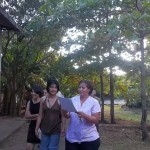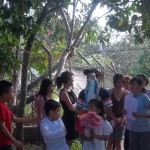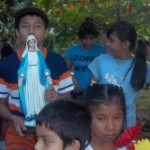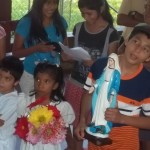Are your childhood Christmas memories some of your fondest memories? As adults, do you remember those traditions with such an air of nostalgia? Well, COAR Children’s Village is keeping one 400 year old Latin American tradition alive: The Christmas Posadas.
The term Posada is one of many Spanish words for “inn” and it describes a nine evening procession and celebration that is still reenacted each Christmas season throughout parts of Latin America. On December 16th, especially in small towns and villages, two villagers are selected to represent Mary and Joseph. In costume, bearing candles, Mary and Joseph begin to wander the streets of their community followed by throngs of neighbors and friends. Each night, they lead the procession through town stopping at a different house to ask for shelter. Though at first denied, Mary and Joseph gain admittance to a neighbor’s house where the entire community sings traditional Christmas carols, prays the Rosary, enjoys a festive Christmas celebration.
Each night for nine nights, the town repeats this tradition. The nine nights represent each month of Mary’s pregnancy. The final night, Christmas eve, Mary and Joseph stop at the town church for shelter. This marks the largest and most grand of the celebrations.
At COAR Children’s Village, each December, the kids hold their own Posadas safely behind our walls. Two internos are chosen as Mary and Joseph and dress in costume. All of the housemothers and children follow them as they go from house to house (COAR kids live in small, 4-5 room houses with a housemother) seeking shelter. The kids carry candles and sing songs as they wander up and down the COAR hills until they ultimately reach the house offering them shelter.
Unfortunately, the Posadas are a dying tradition. In big cities, across the globe, modernity has begun to chip away at the tradition religating it to a more rural or village fete. However, in 2015, gang violence and delincuency in El Salvador has reached even the most remote mountain village. During my last visit, I asked several taxi cab drivers if they expected the Posadas to continue as normal. All of them felt that there would be far fewer this year – even in the smaller communities. They shared with me that the average Salvadoran just doesn’t feel safe being on the street at night – even among crowds of their neighbors. The taxistas felt that local parishes may hold posada celebrations but the nightly processions may slowly disappear.
At least, the children at COAR will be able to keep this wonderful and unique tradition alive – to share with their children one day. Maybe, 20 years from now, one of our kids will stand up at his/her local Church and offer to lead the Posadas committee and bring back this tradition to the town and its neighbors. Until then, let’s all pray for peace and improved safety for everyone in El Salvador.

